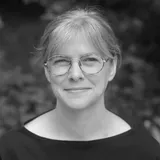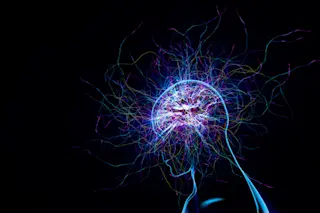One of the most difficult problems in neuroscience and philosophy is the study of consciousness. How does consciousness arise from physical matter?
In a 1995 paper, philosopher David Chalmers dubbed this question "the hard problem." The "easy" problem, he said, is figuring out how the brain does things like see, learn, think and make decisions.
While not exactly easy, at least these questions can be approached scientifically and, given the right techniques and technology, might eventually be solved. The "hard" problem, according to Chalmers, is figuring out why and how, when we see, learn, think and so on, we have a subjective experience.
Some experts think we're getting close to solving that problem. Others think it might never be solved.
Competing Theories of Consciousness
Kristina Krasich is a neuroscientist at Elon University and a two-time winner of the Neurophilosophy of Free Will World Wide Competition. Krasich says there has been considerable progress in recent years on the "easy" problem.
"We've been at least able to assess what I will call enabling conditions," she says, "what allows consciousness to emerge, or at the very least, what conditions prevent consciousness from occurring." Much of this progress, Krasich says, is due to better technologies for studying the brain in action.
That still doesn't tell us how we get from meat to mind, but many people in many different fields of study — neuroscience, philosophy, information science, mathematics, linguistics, psychology, physics and more — are working on it.
Read More: Brains Might Sync As People Interact — and That Could Upend Consciousness Research
Integrated Information Theory
One of the most promising current theories of consciousness is integrated information theory (IIT), developed by Giulio Tononi, a neuroscientist at the University of Wisconsin. Consciousness, according to IIT, requires the integration of a huge amount of information.
Consciousness emerges in a system — in any system — when that information is sufficiently integrated. It's not enough for a system to possess loads of information (as does your phone); it has to connect all that information meaningfully. And the more that information is integrated, the more conscious the being that integrates it.
IIT has taken a lot of criticism because it allows for the possibility of consciousness, or at least a very rudimentary form of consciousness, in places we normally wouldn't expect to find it — in a proton, for example. It's somewhat like a neuroscientific version of panpsychism, the idea that consciousness is inherent in all matter.
Global Workspace Theory
A competing theory is known as Global Workspace Theory (GWT), first developed in the 1980s by Bernard Baars. GWT holds that consciousness is formed in an internal "workspace" as the brain processes information. According to GWT, consciousness is a byproduct of the information processing that underlies behavior.
Others are studying the workings of the brain using modern technologies, such as functional magnetic resonance imaging (fMRI) and transcranial magnetic stimulation, in attempts to unravel the conundrum of consciousness. Some, including Chalmers, now co-director of NYU's Center for Mind, Brain and Consciousness, are even probing the connection between consciousness and quantum mechanics.
So, where do we stand?
Read More: Can Quantum Physics Explain Consciousness? One Scientist Thinks It Might
The Quest for Neural Correlates of Consciousness
Much of today's study of consciousness is focused on finding the neural correlates of consciousness — neural patterns in the brain associated with specific conscious experiences or states.
While attending the annual meeting of the Association for the Scientific Study of Consciousness (ASSC) in Bremen, Germany, in 1998, Chalmers and Christof Koch, a neuroscientist and champion of IIT, went out for drinks one evening and got to talking about the future of consciousness science.
Koch bet his friend a case of wine that within 25 years, science would have found clear (note the word 'clear') neural correlates of consciousness. Koch now insists he was genuinely convinced that science would meet that deadline, even if some of that conviction was due to youthful exuberance.
This June, at the 2023 conference of the ASSC — 25 years after the wager — the bet was settled. Experiments using fMRI and implanted brain electrodes looked at the brain patterns of human patients, and compared those to the conscious experience the patients reported when looking at pictures of faces and other objects. The results — presented at the conference — seemed to support some of the predictions of both GWT and IIT. However, the results were anything but clear.
Koch admitted that these results showed that no clear neural correlates had been found. He graciously presented his friend with six bottles of 1978 Madeira. (Chalmers says he was delighted — he'd expected a 1998 vintage.) Koch also asked for a rematch, double or nothing. Within another 25 years, Koch wagered, clear evidence would be found. Chalmers didn't hesitate to take the bet but says he'll be happy if he loses this time and thinks that the chances he will lose are better now, owing to improved technologies for observing the brain.
However, neither of the wagers requires solving the hard problem. Nailing down the neural correlates of consciousness, even if it can be done, won't necessarily show how consciousness emerges from matter. That question has philosophical implications that may or may not be amenable to science.
A New Generation of Consciousness
In 25 years, Chalmers will be 82 and Koch 92. Krasich, who is far younger than both men, is part of a new generation of scientists working on this problem. She describes herself as having a "bright-eyed and bushy-tailed approach," perhaps not confident that the problem will be solved but hopeful. She expects that continued development of technology and more scientific discovery will lead to progress. "But," she adds, "it's really unclear if we'll be able to answer with certainty how consciousness emerges."
She is confident of one thing, though. Any progress will be the result of an interdisciplinary approach. "I don't think that my field of study will have the answer. I don't think that computer science will have the answer. I think that it will be an interdisciplinary answer." There well may be more wagers to come as teams of scholars continue to tackle the perplexing problems of consciousness, both "hard" and "easy."
Read More: Why Do Some People Always Remember Their Dreams, While Others Almost Never Do?















